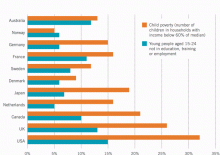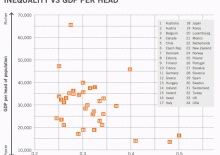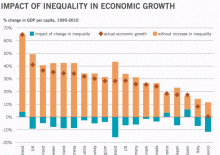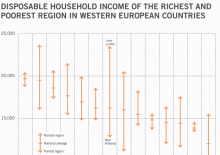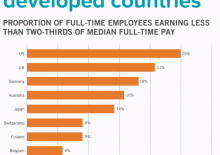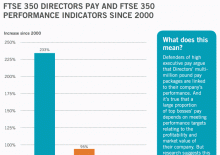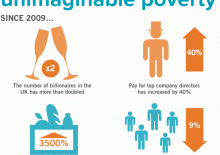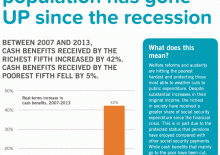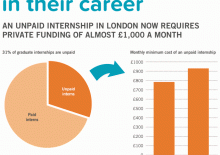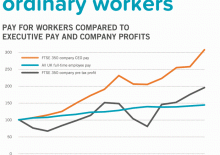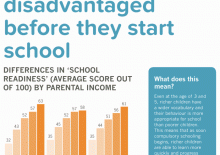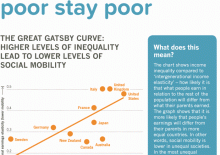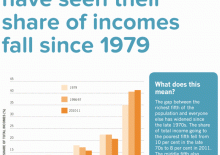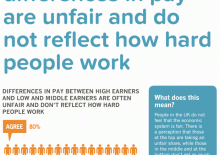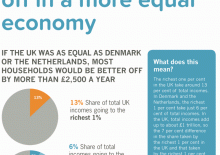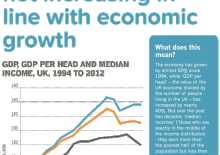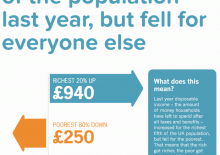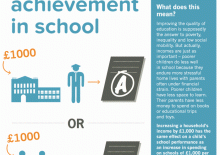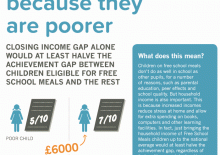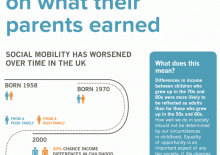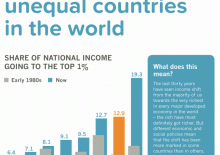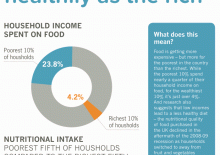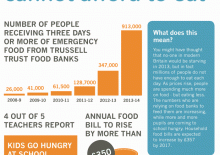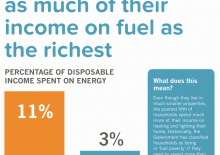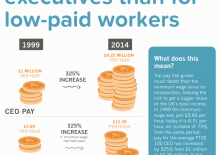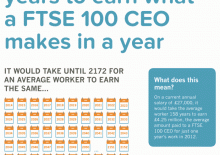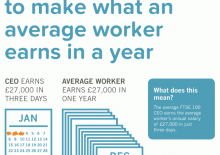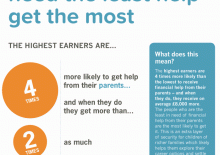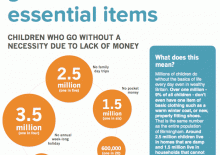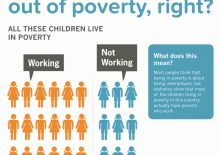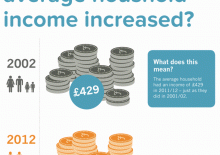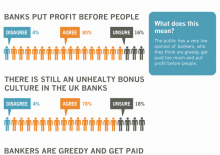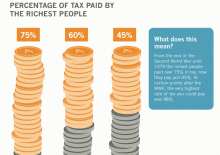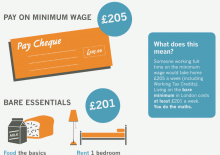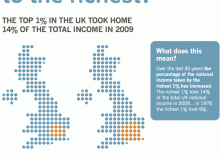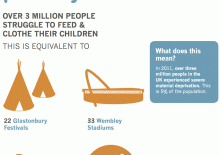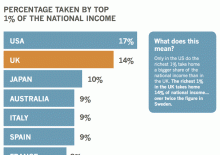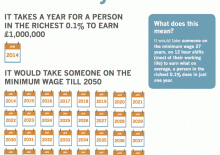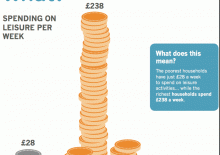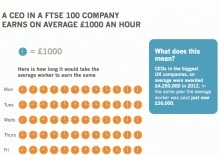Tag: income inequality
Briefing 65: Privately educated children earn more than state-educated children with the same grades
30 October 2015 • Where you go to school influences how much you earn, regardless of what grade you get!
Briefing 64: There are more disadvantaged children in Britain than in many other advanced economies
16 October 2015 • A higher proportion of UK children grow up in households with incomes well below the national median, while more young people in the UK are not in education, employment or training
Briefing 63: Reducing inequality doesn’t harm the economy
24 July 2015 • Higher inequality does not make countries richer
Briefing 62: Rising inequality has reduced the UK’s economic growth
10 July 2015 • Analysis from the OECD think-tank found that extreme inequality is bad for growth
Briefing 61: Regional inequality in the UK is the worst in Western Europe
26 June 2015 • The gap between the richest and poorest region in the UK, in terms of disposable income, is the widest in the EU
Briefing 59: There are more low-paid workers in the UK than in other advanced economies
29 May 2015 • A higher percentage of workers earn less than two thirds of median full-time pay in the UK than in most other developed countries
Briefing 58: The richest get richer, the poorest get poorer
15 May 2015 • When taking inflation and spending habits into account alongside incomes, standards of living have declined for the poor but improved for the rich
Briefing 57: Top pay increases are way out of proportion to company performance
24 April 2015 • Britain's top executives are supposed to be paid according to how their companies perform - but pay in recent years has increased far more quickly than performance
Briefing 55: Great wealth exists in the UK alongside unimaginable poverty
20 March 2015 • Since 2009 executive pay has soared and the number of billionaires has increased, while food bank use has rocketed and pay for ordinary workers has fallen
Briefing 54: The value of cash benefits paid to the rich has gone UP since the recession
6 March 2015 • Between 2007 and 2013, cash benefits paid to the richest fifth of the population increased by 42%. For the poorest fifth, benefits fell by 5%
Briefing 53: Being born into a rich family gives people a headstart in their career
20 February 2015 • Richer parents can fund valuable unpaid internships for their children, giving them an unfair advantage over those from poorer households
Briefing 52: Pay for top bosses is growing 5 times faster than for most UK workers
6 February 2015 • Pay for Chief Executives of FTSE 350 companies has increased more than twice as fast as company profits... and around five times as fast as pay for the average UK worker
Briefing 51: Poorer Children are already disadvantaged before they even start school
16 January 2015 • Differences in income hinder children's progress from a very young age
Briefing 50: In the UK, the rich stay rich and the poor stay poor
28 November 2014 • Equal opportunities depend on more equal outcomes - the UK is more unequal than other countries, meaning fewer people who are born poor become rich
Briefing 49: The poorest 80% of the UK population have seen their share of incomes fall since 1979
14 November 2014 • The richest are steadily pulling away from everybody else
Briefing 46: Most people think that differences in pay between high and low earners are unfair
3 October 2014 • Polling shows that an overwhelming majority of people in the UK think that differences in pay between high and low earners are unfair and don't reflect how hard people work
Briefing 45: Households would be better off in a more equal economy
19 September 2014 • Reducing the share of total UK income going to the richest 1% to Dutch or Danish levels & sharing the difference across the rest of the population would be worth an extra £2,500 a year to every household
Briefing 44: Ordinary people are not getting a fair share of the proceeds of economic growth
5 September 2014 • While the economy has grown by 50% over the last 20 years, pay for those in the middle has only gone up by 20%
Briefing 42: Incomes increased for the richest last year, but fell for everyone else
8 August 2014 • The richest fifth of the UK population saw their incomes increase by £940 in 2013. But incomes were down by £250 for the other 80% of the population... and by £381 for the poorest fifth
Briefing 41: Increasing family incomes improves children’s achievement in school
31 July 2014 • Raising household incomes by £1,000 would lead to better outcomes for poorer children than spending an extra £1,000 per child on schools
Briefing 40: Poorer children do worse in school because they are poorer
25 July 2014 • Studies show that increasing household incomes would reduce the school achievement gap between rich and poor children, regardless of school or parenting quality
Briefing 39: Social mobility in the UK is falling
17 July 2014 • Differences in income between children are increasingly likely to be mirrored as adults
Briefing 36: The UK has become one of the most unequal countries in the world
27 June 2014 • Share of total income going to the richest 1% has grown faster in the UK than in most other advanced economies
Briefing 35: The Poor cannot afford to eat as healthily as the rich
20 June 2014 • Poor people spend a much higher proportion of their income on food than richer households, yet still struggle to afford a healthy diet
Briefing 34: People in the UK cannot afford to eat
13 June 2014 • Though the UK's total wealth is amongst the highest in the world, many people across the country cannot afford to eat
Briefing 33: Poor households spend more of their income on fuel than the richest
4 June 2014 • The poorest 20% spend an average 11% of household income on energy. The richest 20% spend just 3%
Briefing 29: Pay has grown more quickly for the super-rich than low-paid workers
2 May 2014 • If the Minimum wage had grown at the same rate as CEO pay over the past 15 years, it would be £9 per hour higher
Briefing 28: It would take the average worker 158 years to earn what a FTSE 100 CEO makes in a year
25 April 2014 • Based on a UK average salary of £27,000, most people would have to work until the year 2172 to earn what a typical FTSE100 CEO makes in a year
Briefing 27: A CEO earns the UK average salary in just three days
17 April 2014 • It takes a FTSE 100 CEO just three days to earn the average UK workers' annual salary of £27,000
Briefing 24: The people who need the least help, get the most
28 March 2014 • The highest earners are more likely to have received financial support from their parents
Briefing 21: millions of children go without essential items
7 March 2014 • Research shows that children have to cope without everyday items that most people would consider basic necessities
Don’t miss out – subscribe to our FREE weekly briefing.
Recent briefings
- Briefing 65: Privately educated children earn more than state-educated children with the same grades
- Briefing 64: There are more disadvantaged children in Britain than in many other advanced economies
- Briefing 63: Reducing inequality doesn’t harm the economy
- Briefing 62: Rising inequality has reduced the UK’s economic growth
- Briefing 61: Regional inequality in the UK is the worst in Western Europe


